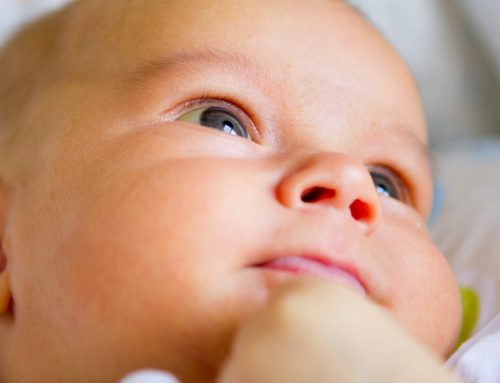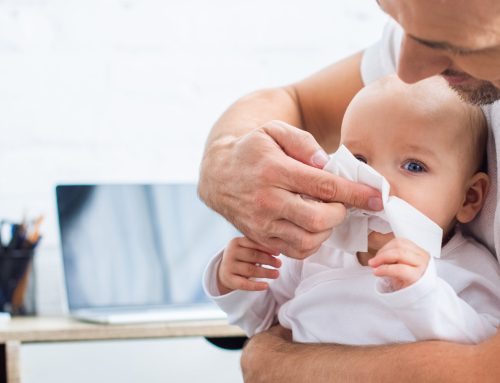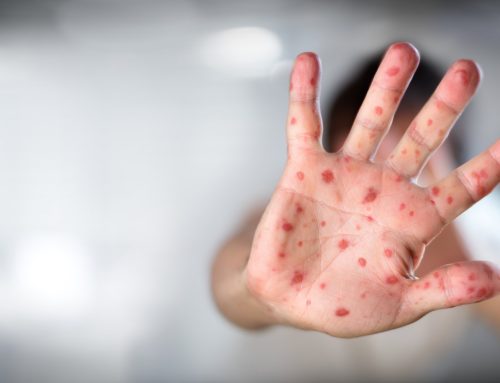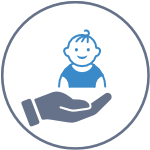
Congratulations on becoming a parent for the first time!
You’re overjoyed, exhausted, thrilled and totally in love with your baby. As you adjust to having a little one in the home and adapt to parenting and take care for them. Add one more thing to your to do list – keeping your baby healthy and safe from the coronavirus.
Most babies who have had COVID-19 seem to be healthy without showing any signs of COVID-19. However, some newborns, especially those born prematurely (earlier than 37 weeks), might be more likely to develop severe illness with COVID-19, so it’s important to seek immediate care for them if they show any of the following symptoms: high fever, rapid breathing, poor feeding, difficulty breathing or prolonged crying.
Here are some tips for keeping yourself and your baby healthy and safe against the new coronavirus.
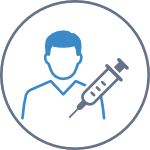
Get vaccinated
COVID-19 vaccines reduce the risk of people getting COVID-19 and can also reduce the risk of spreading it. Be sure to get everyone in your family vaccinated against COVID-19.
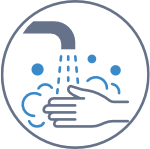
Wash your hands often
This is the single most important thing that you can do to stop the spread of viruses. Wash your hands with soap and water for at least 20 seconds, or use an alcohol based hand sanitizer. Especially before handling your baby.
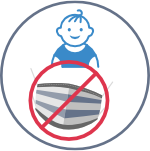
Do not put a mask or face shield on your baby
Babies move a lot. Their movement can make the plastic face shield or mask block their nose and mouth, or cause the strap to choke them. Children under age 2 should not wear masks or face shields.
Limit visitors to see your new baby
The birth of a new baby is an occasion to celebrate and typically brings families together to do so. Before allowing visitors into your home, consider the risk of COVID-19 to yourself, your baby and the people who live with you, especially grandparents or other people at increased risk of severe illness from COVID-19.
Bringing people who do not live with you into your home can increase the risk of spreading COVID-19. Some people who are infected may not show symptoms and can spread the virus. Preferably avoid having visitors over. If you do have visitors, ask them to wash/sanitize their hands before they come inside your home, ensure that they wear a mask at all times.
Limit in-person gatherings to avoid the spread of COVID-19. Consider other options, like celebrating virtually, for people who want to see your new baby.
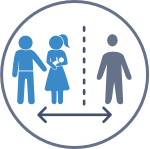
Social distance your baby
Other than healthcare visits and child care, limit taking your baby to places outside of your home as much as possible. If you must, keep your baby at least 6 feet away from people outside your household and especially very far away from people who are sick or show symptoms of being sick.
Stay up-to-date with your baby’s routine checkups
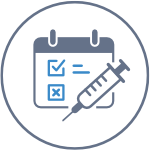
Routine healthcare is very important and is even more critical during a pandemic. Don’t skip baby’s healthcare appointments. When possible, do your children’s well-baby visits in person, so your pediatrician can do important screening tests to check development.
If you think you or your baby might have COVID-19 or might have been exposed to someone with COVID-19, call your baby’s healthcare provider before visiting.

Ensure your own social, emotional, and mental health
As we navigate through these uncertain times, remember that taking care of your own physical and mental health is just as important as taking care of your children’s physical and mental health. Learn about ways to cope with stress and tips for caring for yourself during the COVID-19 pandemic. Call your healthcare provider if you think you are experiencing depression after pregnancy. It’s okay to ask for help. You don’t have to do it all yourself.
Know the signs of COVID-19 in babies
Monitor your baby for signs of COVID-19, including:
- Fever 38° C (100.4° F) or higher
- Cough / Runny nose
- Vomiting
- Diarrhea
- Poor feeding
- Being overly tired
- Troubled breathing
If your baby has symptoms or you suspect COVID-19 exposure, call the paediatrician for advice.
